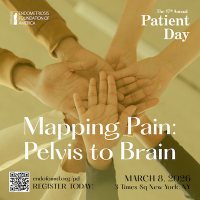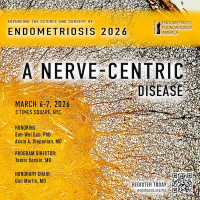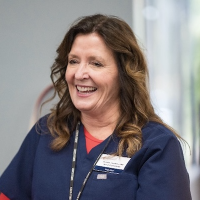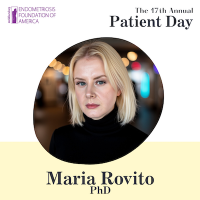Bruce Yaffe, MD
The gut feeling: When is “IBS” really endometriosis?
Patient Awareness Day
The Lifecycle of Endometriosis: From Diagnosis to Coping with Disease
Sunday April 17, 2016
Lenox Hill Hospital, Einhorn Auditorium
Thank you everyone and good morning. I have a really different perspective on all of this than most of the gyns here. In today’s fragmented medical world where appointments are getting shorter and shorter and there is not a lot of communication between different doctors I can appreciate the levels of frustration that occur from patients and from doctors. It is really hard to not get angry when you see someone who has been suffering for ten years and who basically is at risk for infertility. They have been shoveling from doctor to doctor with symptoms that are diagnosed as irritable bowel syndromes. As a matter of fact I would bet that most of you are here obviously because of your involvement with endometriosis but I would bet that almost all of you, at one point or another, have been told that you had irritable bowel syndrome.
I think that in this day and age it is very important for all of you who already know about endometriosis to get out and explain to friends, relatives, peers, etc. that since one out of ten women has this condition most people are probably cured best, not by gynecologists but by menopause. I would say that since most people who are diagnosed get diagnosed at seven to ten years after the initial symptoms occur. I would say most people do not get diagnosed ever! And menopause is the cure. A lot of people go through life just suffering and never even know that they have the disease. And some of you might even be in the room here.
If one out of ten women has endometriosis, and endometriosis, I want to touch on something Dr. Seckin said earlier, is a condition of inflammation. You have little blood blisters that get inflamed. They attach to the bowel, they attach to the bladder. Inflammation in the body affects all parts of the body. As Dr. Seckin mentioned in the article that just came out a few weeks ago, way off, way off base in terms of endometriosis. A recent article came out that showed that people who have Alzheimer’s disease, who have periodontal disease – if the periodontal disease gets fixed the Alzheimer’s disease is much more slowed down because the inflammation from the dental inflammation exacerbates the Alzheimer’s disease. People with psoriasis have an increased risk for cardiovascular disease. Again, there is a lot of inflammation with severe psoriasis. I am not talking about a little bit of psoriasis. People who have severe psoriasis have excess cardiovascular disease and people who have endometriosis have excess other conditions, not to mention the autoimmune components, etc.
The fragmentation of medicine, the frustration of patients, the problems with insurance, etc. all compound the fact that when people get endometriosis and have their lives changed, and get anxious and depressed, and go from doctor to doctor that exacerbates everything including irritable bowel syndrome, which is a condition severely exacerbated by anxiety and depression.
Ten years of suffering and why is that? Why is irritable bowel syndrome something that people come to me and say, “I’ve been told I have irritable bowel syndrome”. Why is it that they have not been diagnosed earlier? Well, irritable bowel syndrome is what? It is crampy abdominal pain. It is bloating. It is intermittent constipation and diarrhea. Sometimes it is painful bowel movements. All of that is also associated with endometriosis, in many cases when endometriosis involves the bowel wall. Little blood blisters on the bowel wall certainly can cause a lot of digestive tract symptoms. And do most primary care doctors ask 25-year-old women about painful sex or painful periods? I do not think so.
I think that in this day and age it is important for the patient to bring up the painful sex and the very painful periods. It is not normal for women to have periods that cause so much pain that they miss work, the pain goes into the back and into the legs. An average primary care doctor, an average gastroenterologist just does not take the time or the effort to ask these questions because quite honestly we do not have the time in this day and age.
We do tests. We start doing CT scans. CT scans, sonograms, colonoscopies, endoscopies – none of these things reliably are going to show endometriosis unless there is a big endometrioma or a big cyst. The patient ultimately winds up with a diagnosis of irritable bowel syndrome. How often does the average gynecologist suggest laparoscopy? Most gynecologists do not do laparoscopy on a routine basis and if they do, as Dr. Shin said, they are not competent in terms of excision therapies. And the idea of peek and shriek kind of sounds scary to me, a gynecologist who does do an occasional laparoscopy might be doing the peek and shriek technique. I am not sure that is the right way to go. There are not that many people in the field such as Dr. Seckin, Dr. Shin to even go to and I think that is imperative for those of you out here who already know about the condition to really get the word out.
How does endometriosis affect the bowel? Imagine little blood blisters sticking to the lining of the bowel as you saw in some of the earlier slides. The bowel can actually get distorted. The small bowel is 35 feet long and it should fluidly move within the abdominal cavity. Well, if there are little blisters stuck and adhesions stuck to the bowel the bowel no longer can move in the way that it usually does. It is amazing to think that 35 feet of small intestine can work in the way it does with there is constant movement in one direction. And the food and the liquids inside the small bowel get pushed towards the colon where the bacteria should be residing. We all have 11 trillion bacteria in our colons. And if these adhesions inhibit the activity of the small bowel it can lead to little collections of fluid in the small bowel, which gradually leads to the idea of little puddles of fluid that can form bacterial collections and we start hearing about small intestinal bacterial overgrowth syndrome, SIBO. How many of you have heard about that in conjunction with irritable bowel syndrome?
SIBO is very common. We get bloating, we get gas, we get cramps, we get diarrhea because we all have 11 trillion bacteria in our colons. But we are not supposed to have bacteria in our small bowels. When bacteria backs up in the small bowel because of these adhesions and the previous scarring from either surgery or from the endometriosis itself we wind up having collections of bacteria that are not being pushed out of the small bowel with normal peristalsis. The consequence is when carbohydrates, simple carbohydrates get into the small bowel where there is bacteria it is not supposed to be there. The bacteria metabolize the carbohydrates and you get bloating and gas and cramps, and bloating and gas and cramps are the symptoms of endometriosis so again, we think of irritable bowel syndrome instead of endometriosis. The two are very much overlapped. As a matter of fact, I would contend that almost everyone who has endometriosis whether they have had surgery or not has some component of an irritable bowel just on the basis of the anxiety and depression that results from the endometriosis. And, they might also have some degree of small bowel bacterial overgrowth, which leads to excessive bloating and gas.
I would suggest that almost everyone with endometriosis whether they have had surgery or not should be on perhaps an intermittent medication called Xifaxan, which is an antibiotic that kills bacteria in the small bowel and has been shown not to be absorbed in the system so it is not like a typical antibiotic that screws up the normal microbiome of the body. It does not give a yeast infection. It is not absorbed but it kills bacteria and just goes through the bowel and out the other end. It decreases bacterial contamination of the small bowel, decreasing bloating and gas. That in conjunction with diet and there is something called the FODMAP diet. It comes out of the same Monash University that you mentioned earlier in Australia. The FODMAP diet is Fermentable Oligo-saccharides, Di-saccharides, Mono-saccharides and Polyols. These are different carbohydrates that get metabolized by bacteria and that can be anything from fructose fruit sugar, watermelon or apples can cause bloating and gas if people do not absorb fructose well or if bacteria is in the small intestine. You eat an apple and the bacteria metabolizes the fructose in the apple because the bacteria encounter it very soon after eating because it is in the small intestine and the consequences you eat an apple and you feel horrible. Bloating and gas after an apple, it is not supposed to be.
I think it is really important for everyone to realize that yes, irritable bowel syndrome is a component of endometriosis because of the anxiety and depression, the bacterial overgrowth and because anyone with food intolerances or with anxiety and depression can have an exacerbation of bowel activity. If you put a gun to someone’s head they poop in their pants. There is a brain gut connection. All of these things are interconnected. So, between the inflammation of endometriosis and the social consequences of endometriosis it is not at all unusual to have an irritable bowel and it is so much easier for a gastroenterologist or a primary care doc to say “your blood tests are normal, your CT scan is normal, your sonogram is normal, everything is normal, you have an irritable bowel syndrome” without even asking about the menstrual questions or about the painful sex questions because we do not have the time and quite honestly it just is not something that primary care physicians usually think about, at least in my experience.
I thank you and I hope that you will all go out and tell your friends and peers to bring the questions up with the doc because the doc often is not going to bring those questions up. Good luck and thank you.










